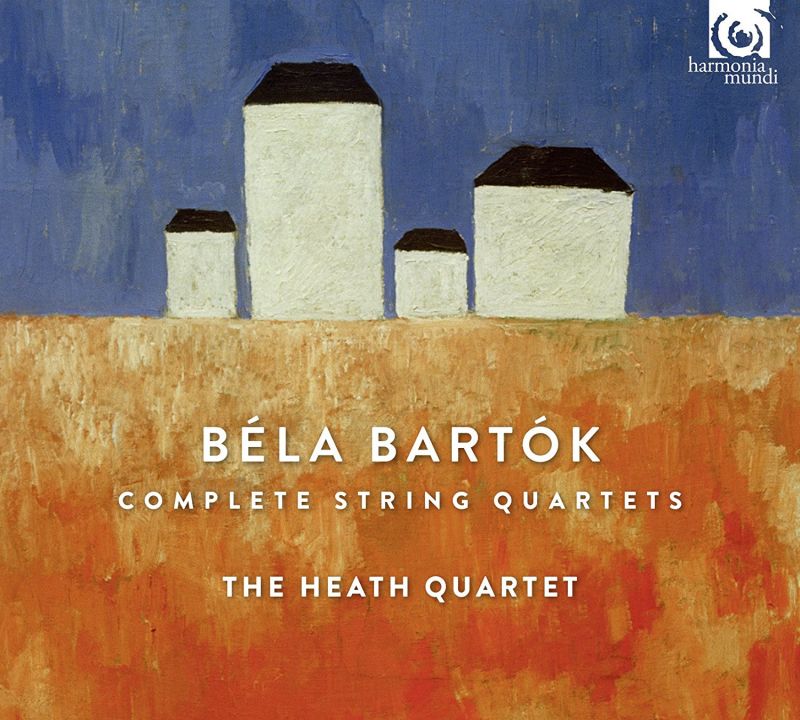BARTÓK Complete String Quartets
View record and artist detailsRecord and Artist Details
Composer or Director: Béla Bartók
Genre:
Chamber
Label: Harmonia Mundi
Magazine Review Date: 09/2017
Media Format: CD or Download
Media Runtime: 158
Mastering:
DDD
Catalogue Number: HMM90 7661/2

Tracks:
| Composition | Artist Credit |
|---|---|
| String Quartet No. 1 |
Béla Bartók, Composer
Béla Bartók, Composer Heath Quartet |
| String Quartet No. 2 |
Béla Bartók, Composer
Béla Bartók, Composer Heath Quartet |
| String Quartet No. 3 |
Béla Bartók, Composer
Béla Bartók, Composer Heath Quartet |
| String Quartet No. 4 |
Béla Bartók, Composer
Béla Bartók, Composer |
| String Quartet No. 5 |
Béla Bartók, Composer
Béla Bartók, Composer Heath Quartet |
| String Quartet No. 6 |
Béla Bartók, Composer
Béla Bartók, Composer Heath Quartet |
Author: Richard Bratby
The Heaths follow the relatively recent interpretative approach (typified by the Emerson Quartet’s 1988 cycle) that views these works primarily as part of the classical tradition. Their playing isn’t as glossy, perhaps, as other recent entrants into this field, such as the Jerusalem Quartet, but they have a powerful understanding of the music’s structure, coupled to superlative technical skill. Sensibly, they don’t try to fake a Hungarian accent: instead, their awareness of the music’s roots is incorporated into a wider expressive language. In the first two quartets, for example, there’s a sort of Jugendstil curvaceousness – enhanced by Oliver Heath’s lustrous tone plus discreet ensemble portamentos – that places these works in the context of Austro-Hungarian late Romanticism. The peppery fiddle tune that launches the Scherzo of the Second Quartet buzzes with folky intensity but, crucially, keeps moving forwards.
In fact, I found myself repeatedly scribbling down the word ‘momentum’. Not necessarily in the sense of relentless energy (though they can heat things up when they need to), but of an inevitable pull towards the culminating moment when a movement suddenly yields up its secrets. That makes for a powerfully vivid and focused account of the Third Quartet, and a Fifth Quartet that, not entirely predictably, comes across as the lightest of the set. But elsewhere, it’s devastating: the tear-stained climax of the first movement of the First Quartet, the sudden, poignant fade at the end of the first movement of the Sixth and the piercing stab of pain in that work’s closing bars. They play the impassioned solos of the Fourth’s central Non troppo lento relatively straight: the ardour grows from within, culminating in a final, misty vison of nocturnal stillness that is – no other word for it - magical.
It’s all captured by Harmonia Mundi in transparent and natural recorded sound which easily encompasses both the quietest sul ponticello whisper and (a Heath Quartet speciality) ringing full-ensemble chords that glow from within. Newcomers to the Bartók quartets will find this a sincere, imaginative and splendidly played entry point; old hands will quickly find 101 new reasons why these extraordinary works rank among the supreme achievements of 20th-century music.
Discover the world's largest classical music catalogue with Presto Music.

Gramophone Digital Club
- Digital Edition
- Digital Archive
- Reviews Database
- Full website access
From £8.75 / month
Subscribe
Gramophone Full Club
- Print Edition
- Digital Edition
- Digital Archive
- Reviews Database
- Full website access
From £11.00 / month
Subscribe
If you are a library, university or other organisation that would be interested in an institutional subscription to Gramophone please click here for further information.




